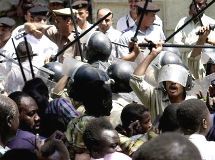Mistrust and confusion grip Sudanese community in Egypt
By MAGGIE MICHAEL, Associated Press Writer
CAIRO, Egypt, Aug 26, 2004 (AP) — The U.N. refugee agency says the situation is too fluid in Sudan to determine the status of people who have fled that country’s troubled south and west. Its suspension of refugee interviews while continuing to grant protection has added to the fear and uncertainty for the almost 1 million Sudanese in Egypt.
 Scores of Sudanese including some from strife-torn Darfur staged an emotional and violent protest at the United Nations High Commissioner for Refugees Cairo offices on Wednesday.
Scores of Sudanese including some from strife-torn Darfur staged an emotional and violent protest at the United Nations High Commissioner for Refugees Cairo offices on Wednesday.
“We were caught by surprise yesterday. We never expected to see what we saw yesterday,” Damtew Dessalegne, the assistant regional representative of the United Nations High Commission for Refugees in Cairo, told The Associated Press a day after his building was pelted with rocks, leaving some windows shattered.
Riot police firing tear gas and wielding clubs clashed with the protesters. Around 40 Sudanese were injured and 22 were detained and may face assault or other charges, according to an Egyptian security official speaking on condition of anonymity.
“Nobody asks about us and nobody cares about us,” protester Hassan Ishak, who said he was from Darfur, told the AP Wednesday.
In both Egypt and Chad, officials said, the UNHCR in June indefinitely suspended attempts to determine on a case-by-case basis who is eligible for refugee status. Until the process of making individual determinations resumes, though, Sudanese in both countries receive blanket protection.
“UNHCR is still registering Sudanese refugees,” said Marie-Helene Verney, spokeswoman at UNHCR headquarters in Geneva . “Once they’re registered with UNHCR they are being given a yellow card. Once they have that yellow card they have residency in Egypt, they can work in Egypt, they have protection from UNHCR. What the office cannot do at this stage is to be able to decide each case one by one.”
Verney said that with the changing situation in Sudan, the Cairo office, which was getting about 150 new cases a month, decided it was unable for the moment to continue with the complicated process of deciding each case individually.
Verney said Wednesday’s protest was the first anywhere since individual assessments were suspended. She said that may be because there are so many Sudanese in Egypt.
Dessalegne, the Cairo-based official, also questioned the involvement of the South Center for Human Rights, a group that presented a petition to the UNHCR last week urging it to resume refugee interviews and then called for the protest. Desslaegne said the center appeared to have a poor understanding of what the agency could do for refugees.
Wagdi Abdel Aziz, the head of the South Center, responded by accusing the U.N. agency of doing little to help the protesters Wednesday and now “pushing” Sudanese to return home.
Sudanese have been coming to neighboring Egypt for decades, some as economic refugees, others to escape the long-running war in the south, and others fleeing the more recent violence in Darfur. The Sudanese government is accused of unleashing Arab militia on African civilians in response to a rebellion by two African groups in Darfur.
The Sudanese government and southern rebels began a final round of peace talks in June aiming at ending 21 years of war unrelated to events in Darfur. Darfur peace talks are in the early stages.
Essa Mohammed Ahmed Younis, who was among the protesters in Cairo, was concerned that the refugee agency might be swayed by a possible peace agreement in the south. Younis is from Darfur.
“My problem with the Sudanese government will not be solved if peace prevailed in the south. I have nothing to do with the south,” he said.
Younis said he arrived in Egypt seven months ago after Arab militia known as the Janjaweed attacked his village and killed his brother.
Ishak, another protester, said he worked as a cattle merchant until the day “the Janjaweed attacked our village” in Darfur. He said he made his way to Cairo seven months ago.
“I can’t find job. I have no source of income,” he said.
Verney, of UNHRC, said few of the Sudanese in Egypt were from Darfur. Most refugees from Darfur, the western Sudanese region that the United Nations has said is the scene of the world’s worst humanitarian crisis, are in Chad.
“We have a lot of Sudanese people in Egypt basically saying they are from Darfur who are clearly not from Darfur at all never been near Darfur,” Verney told the AP.
At the same time, she said, “it’s quite sure that some genuine refugees from Darfur escaped to Egypt. Rather than taking the risk of penalizing some of these people, we just thought we’d better just issue blanket protection.”
— –
EDITOR’S NOTE:
Associated Press Writer Alexander G. Higgins contributed to this story from Geneva.
